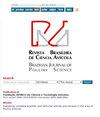孵化早期高碳酸血症条件对肉鸡孵化率的有益影响。胚胎死亡率和产后表现
IF 1.1
4区 农林科学
Q3 AGRICULTURE, DAIRY & ANIMAL SCIENCE
引用次数: 1
摘要
本文章由计算机程序翻译,如有差异,请以英文原文为准。
Beneficial Impact of Hypercapnic Conditions During Early Incubation on Broiler Hatchability. Embryo Mortality and Postnatal Performance
We assessed the extent to which CO 2 levels altered different hatching and chick parameters. In Experiments 1 and 2, a total of 16,184 eggs from Cobb 500 breeders were incubated in single stage incubators under three different conditions: (a) standard ventilated incubator (CON, Exp.1 and 2); (b) increasing CO 2 levels during the first 10 days of incubation until 0.7% (V7000, Exp. 1) and (c) until 0.8% (V8000, Exp. 2). High levels of CO 2 improved hatchability, possibly due to lower embryo mortality from ED18 to ED21. Internal and external pipping in experiment V8000 started later than in CON; nevertheless, the hatch still occurred before in V8000 as a result of the shorter durations of external pipping and hatch. In Experiment 3, a total of 12,138 eggs from Cobb 500 were incubated in single stage incubators under three different conditions: (a) standard ventilated incubator (CON); (b) increasing CO 2 levels until 1.0% with ventilation (V10000); and (c) increasing CO 2 levels until 1.0% without ventilation (NV10000). Hypercapnic conditions led to better hatchability and lower embryo
求助全文
通过发布文献求助,成功后即可免费获取论文全文。
去求助
来源期刊

Brazilian Journal of Poultry Science
农林科学-奶制品与动物科学
CiteScore
1.80
自引率
9.10%
发文量
60
审稿时长
>12 weeks
期刊介绍:
A Revista Brasileira de Ciência Avícola surgiu em 1999 a partir da necessidade que a comunidade científica possuía de um periódico para veiculação e publicação de seus trabalhos, com a publicação de três números anuais.
A Revista conta hoje com um corpo editorial altamente qualificado e com artigos científicos desenvolvidos pelos maiores especialistas da área, o que a cada dia atrai mais leitores em busca de inovação e respaldo técnico.
Devido à credibilidade que conquistou pelos esforços de sus autores, relatores e revisores, a Revista ganhou caráter de coleção, sendo consultada como fonte segura de estudo desenvolvidos na Avicultura.
A partir de 2003 – volume 5 -, a Revista passou a chamar-se Brazilian Journal of Poultry Science, e todos os trabalhos passaram a ser publicados em inglês. No mesmo ano subiu para quatro o número de revistas por volume, ampliando-se assim os trabalhos publicados anualmente.
 求助内容:
求助内容: 应助结果提醒方式:
应助结果提醒方式:


